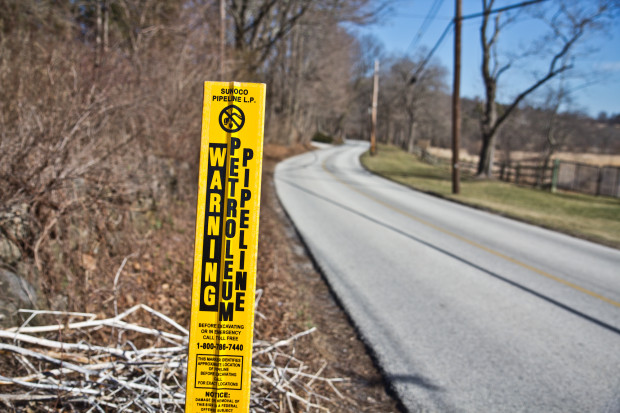Sunoco halts drilling in Chester County where pipeline construction damaged drinking water wells
Sunoco has agreed to halt drilling operations related to the Mariner East 2 pipeline construction in Chester County where 15 households have been without water for the past couple weeks due to aquifer intrusion by horizontal directional drilling. The West Whiteland Township residents who rely on private drinking water wells have experienced cloudy water or loss of water completely. More than 100 community members gathered at the West Whiteland Township building on Thursday night to discuss the situation with both township and Sunoco officials.
Township supervisor George Turner told the gathering that the company agreed to suspend drilling operations until “the water situation is addressed.”
“Effective today they are not drilling north of that site until further notice,” said Turner.
Sunoco has been supplying bottled water and offered to pay for hotel rooms so impacted residents can shower and bathe since the July 4th holiday weekend, when it was first notified by home owners that their wells had either run dry or had tainted water.
Sunoco’s operations punctured the aquifer on June 22, when the company says it notified township officials.
Earlier this week, Sunoco agreed to pay for a new water line to connect residents to a public drinking water source supplied by Aqua. Turner said Aqua had agreed to have a new water main installed within three weeks.
The $3 billion pipeline project will transport natural gas liquids 350 miles across the state, carrying propane, ethane, and butane from the Marcellus Shale fields in Ohio and western Pennsylvania to Delaware County, where it will be shipped overseas to make plastics.
Some residents thanked the quick response from the Township and praised their efforts to get Sunoco to act. One impacted homeowner thanked both the Township as well as Sunoco for providing water and reimbursing him for $2700 worth of filters.
But most impacted homeowners were unhappy that they now had to choose between remaining on their well water, and risk future problems, or hooking up to a public system they worried would not provide the same water quality and could potentially cost them more money down the road.
Others worried that Sunoco would only assume liability for a short period of time, and not be around to address potential future problems.
Private water wells in Pennsylvania are not regulated by federal or state regulations. A recent Supreme Court decision instructed the state legislature to change that, but lawmakers have not acted.
Although Sunoco is required by the Department of Environmental Protection to inform water users along the route about construction at least 72 hours before it began, most said they were not informed. The company is also required to inform impacted water users of a “pollution event.” Just about all residents with impacted water wells who attended the meeting said they heard about the cause of their water problems from their neighbors, not Sunoco.
Jeff Shields, a spokesman for Sunoco, said the company acted as soon as they got the first complaints from residents on July 3.
“I’m not sure if we reached everybody in the amount of time that they had wanted,” Shields said speaking after the meeting. “I know people were on vacation…maybe we had missed them. But we’re trying to work with them now to give them what they need.”
Shields told the meeting that Sunoco would pay for the new water infrastructure to be built, and would pay for water bills using a lump sum formula that calculated average usage. It wasn’t clear how long the company would pay the water bills.
“It’s improtant to us to have decent relationships with our neighbors,” Shields told StateImpact. “We’re impacting their lives, we understand that. And if their well water is impacted we need to do something about it and we are.”
Shields would not say how much the new water mains would cost.
Sunoco representatives were at the meeting with “paperwork” for residents who wanted to get connected to public water.
But David Mano, who has been drinking bottled water and showering at friends houses since last week, called the meeting “smoke and mirrors.”
Mano says Sunoco should be required to hook them up to a public supply without residents having to sign off on any agreements.
“And not wait to say ‘oh look I’m gonna dangle this water over your head until you sign this paper and if you don’t sign this paper now you’ll have to wait,” he said. “If our whole neighborhood is thinking about hiring a lawyer to do a class action lawsuit, are they going to say ‘well we’re not going to hook you up now because you want to sue us?’ That’s not right. They should be forced, literally forced to run water down our street.”
His partner Dianne Salter says since losing their well water, even the simplest things like brushing her teeth and cooking an ear of corn has become a chore that requires a lot of water and a waste of plastic bottles.
“Try washing your face with a bottle of water and a wash cloth,” she said.
Salter says she knew nothing about the pipeline or the construction until her well went bad. Now she worries about the safety of a high pressure natural gas liquids pipeline running near her house, and potential leaks. Natural gas liquid becomes a gas when it leaks out of a pipeline and hits the air.
“That’s what freaks me out because their pipeline is 50 feet away from us and we know nothing,” she said. “So it’s really a fear of an explosion if that did leak into the neighbor’s lawn, and if one lady who smokes drives by and throws her cigarette out the window, we’re goners.”
Correction: An earlier version of this article miscalculated the number of households that had impacted water wells — it is 15 households according the Sunoco. The company has tested well water for 31 homeowners.

















